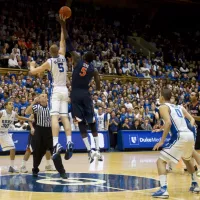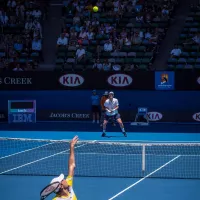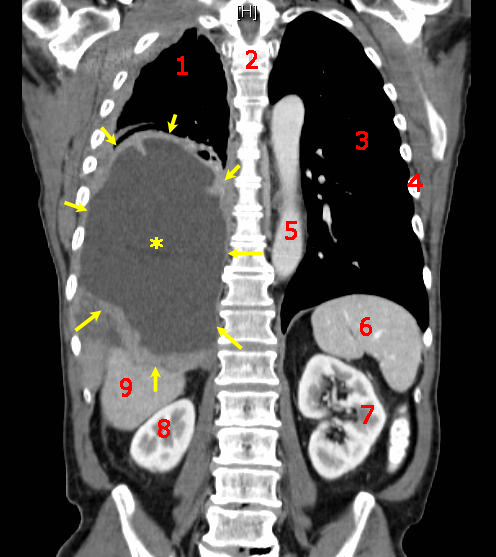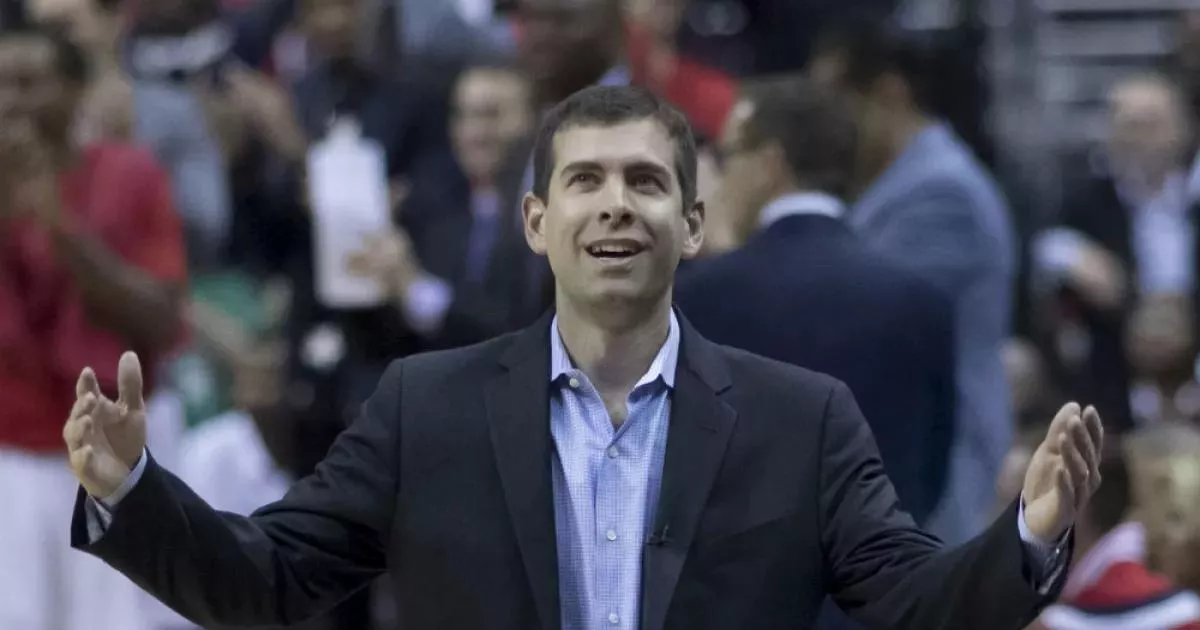Brad Stevens is an American basketball executive, currently serving as the president of basketball operations and de facto general manager for the Boston Celtics. Previously, he gained prominence as the head coach of the Boston Celtics. Before his NBA career, Stevens achieved significant success as the head coach of Butler University's men's basketball team, leading them to two national championship game appearances. His coaching career is marked by a strategic approach and player development skills. His transition from coaching to management signifies a career shift within the basketball world.
1940: Indiana Hoosiers win National Championship led by Branch McCracken
In 1940, Branch McCracken led the Indiana Hoosiers to the national championship at age 31, becoming the second-youngest head coach to achieve this milestone in the NCAA National Championship Game.
1973: Bob Knight's First Final Four Appearance
In 1973, Bob Knight made his first Final Four appearance at age 32. In 2010, Brad Stevens, at age 33, became the youngest coach to lead a team to the Final Four since Bob Knight's appearance.
October 22, 1976: Bradley Kent Stevens Born
On October 22, 1976, Bradley Kent Stevens was born. He later became a basketball executive and former coach for the Boston Celtics.
1978: Last Undefeated Conference Record
In 1978, Joe Sexson led Butler to a 6-0 record in the now-defunct Indiana Collegiate Conference, which was the team's last undefeated conference record until 2010.
1979: Start of Seeding
In 1979 seeding began. In 2010 Butler became the smallest school (enrollment 4,200) to make the Final Four since seeding began in 1979.
1979: Horizon League Formed
In 1979, the Horizon League was formed. In 2010, Stevens was the first coach to lead a Horizon League team to both an undefeated regular season and conference tournament since the league was formed.
1985: Shot Clock Adopted
The shot clock was adopted for the 1985-86 season. In 2010, Butler became the first team since the shot clock was adopted for the 1985–86 season to hold five straight tournament opponents under 60 points.
1995: Sectional MVP and Leading Scorer
In 1995, Brad Stevens was the sectional MVP and the leading scorer in state sectional play with 32.3 points per game.
1995: Tracy Wilhelmy's High School Graduation
In 1995, Tracy Wilhelmy graduated from Rocky River High School.
1999: Graduated from DePauw University
In 1999, Brad Stevens graduated from DePauw University with a degree in economics.
1999: Tracy Wilhelmy's College Graduation
In 1999, Tracy Wilhelmy graduated from DePauw University, where she played soccer.
2000: Promotion to Full-Time Assistant Coach
Following the 2000 season, Brad Stevens was promoted to a full-time assistant coach under Todd Lickliter at Butler University.
2000: Joined Butler University Basketball Program
In 2000, Brad Stevens joined the basketball program at Butler University as a volunteer after quitting his job at Eli Lilly and Company.
2000: Tracy Attends Law School
In 2000, Tracy Wilhelmy returned to school and drove five hours from Case Western's law school to Indianapolis on weekends to see Stevens.
2000: Offered Volunteer Position at Butler, Tracy supports the decision
In the summer of 2000, Brad Stevens was offered the opportunity to volunteer in the Butler basketball office. His then-girlfriend (and now wife), Tracy Wilhelmy, supported his decision to quit his job at Eli Lilly to pursue this opportunity.
2002: Tied NCAA Record for Most Wins
In 2002, Mark Few of Gonzaga set the NCAA record for most wins by a head coach in his first three seasons.
August 2003: Marriage to Tracy Wilhelmy
In August 2003, Brad Stevens married Tracy Wilhelmy. Tracy is a labor and employment lawyer who also acts as Brad's agent.
June 2004: Tracy's Mother's Death
In June 2004, Tracy Stevens' mother passed away from cancer. This event led Brad and Tracy to become involved with the American Cancer Society's Coaches Vs. Cancer.
April 2, 2007: Lickliter resigned from Butler
On April 2, 2007, Todd Lickliter resigned from Butler to take the head-coaching position at the University of Iowa.
April 4, 2007: Named Head Coach at Butler
On April 4, 2007, Brad Stevens became the head coach at Butler University after Todd Lickliter left to coach the Iowa Hawkeyes.
2007: Second-Youngest Coach in Division I Basketball
At the start of the 2007 season, Brad Stevens was the second-youngest coach in Division I basketball and won his first eight games.
2007: Lost Four Starters
In 2007 Butler lost four starters
2007: Tied NCAA Record for Most Wins
In 2007, Mark Fox of Nevada tied the NCAA record for most wins by a head coach in his first three seasons.
2008: Butler Makes NCAA Tournament
In 2008, Brad Stevens' Butler team finished the regular season with a 27–3 record and won the Horizon League tournament, earning a seven seed in the NCAA tournament.
2009: Attention After the Season
After the 2009–10 season, Brad Stevens and Butler University gained significant attention. This included a congratulatory call from then-U.S. President Barack Obama, a guest appearance on David Letterman's show, a 67% increase in Butler admissions inquiries, fan letters from around the world, and an invitation for Stevens to throw the first pitch at a Chicago Cubs versus Florida Marlins game.
2009: Challenge of Not Changing
In 2009, Brad Stevens discussed the challenge of staying true to core values and remaining humble despite increased fame following the 2009-10 season, highlighting it as a great coaching opportunity for himself and Butler.
2009: Salary and Compensation
In 2009–10, Brad Stevens' total compensation was estimated at US$750,000, which included a base salary of US$395,000 plus benefits, a relatively low figure for a successful Division I head basketball coach.
2009: Only DI Coach to Lead Team to Undefeated Conference
In the 2009-2010 season, Brad Stevens was the only coach in Division I to lead his team to an undefeated conference schedule.
February 26, 2010: Broke Coaching Record and Completed Undefeated Conference Schedule
On February 26, 2010, Brad Stevens broke a coaching record and Butler completed an 18-0 undefeated conference schedule.
March 25, 2010: Butler Advances to Elite Eight
On March 25, 2010, Brad Stevens coached Butler to a 63-59 victory over top-seeded Syracuse, advancing to the Elite Eight for the first time in school history.
April 5, 2010: Championship Game Against Duke
On April 5, 2010, Brad Stevens coached Butler against Duke in the championship game. Backup center Avery Jukes scored 10 first half points, tying his season high, and at half time, Duke's lead stood at 33–32.
April 8, 2010: Stevens Signs Long-Term Deal with Butler
On April 8, 2010, Brad Stevens signed a long-term contract with Butler, extending his commitment through the 2021–22 season. The financial terms were not disclosed, but it was indicated that his base salary would increase to approximately $1 million.
2010: First NBA Finals Appearance since 2010
After defeating the Miami Heat in seven games during the Eastern Conference Finals, the Celtics made their first NBA Finals appearance since 2010.
2010: Rankings and Season Challenges
Following the 2010 championship game, Butler was ranked third for the 2010–11 season by ESPN and Fox Sports. Despite facing challenges early in the season, including a rough patch and a 6–5 conference record, the team rallied to win a share of the conference title and secure an NCAA tournament bid.
2010: Challenging Butler's Team to Improve Defensive Field Goal Percentage
In 2010, Brad Stevens challenged Butler's team to improve their defensive field goal percentage from 46% to 40%, which he believed would place them in the top 20 nationally. He used statistical analysis to communicate the importance of defensive improvement to the team, leading to their enhanced performance and a successful March run.
2010: Led Horizon League to Undefeated Season
In 2010, Stevens became the first coach to lead a Horizon League team to both an undefeated regular season and conference tournament since the league was formed in 1979.
2010: Broke NCAA Record for Wins
In 2010, his third year as head coach, Stevens broke the NCAA record for most wins in a coach's first three years, exceeding the previous record by eight wins. He also coached Butler to their first Final Four appearance.
2010: Hosting a Fundraiser for Coaches Vs. Cancer
The day before Butler's 2010 Final Four appearance, Brad and Tracy Stevens hosted a fundraiser for the American Cancer Society's Coaches Vs. Cancer.
March 26, 2011: Butler Beats Florida to Reach Final Four
On March 26, 2011, Butler defeated Florida 74–71 in overtime, earning a spot in the Final Four for the second consecutive year.
April 4, 2011: Butler lost National Championship game
On April 4, 2011, Stevens coached the Bulldogs in their second consecutive national championship game, where the team again lost, this time to the Connecticut Huskies.
2011: Illinois Coaching Vacancy
After the 2011–12 season, Brad Stevens was pursued by Illinois to fill their coaching vacancy but he declined their offer.
2012: Hiring Drew Cannon for Statistical Research
In 2012, Brad Stevens became the first college coach to hire someone specifically for statistical research by adding Drew Cannon to his staff, further emphasizing his commitment to using data analysis in coaching.
March 2013: UCLA Offer and Rumors
In March 2013, UCLA reportedly offered Brad Stevens between $2.5 and $3 million a year to leave Butler, leading to rumors of contract negotiations. However, Stevens ultimately stayed at Butler, reiterating his happiness and commitment to the university.
July 3, 2013: Stevens Hired as Celtics Head Coach
On July 3, 2013, Brad Stevens was hired as the head coach of the Boston Celtics.
2013: Hired as Head Coach of the Boston Celtics
In 2013, Brad Stevens was hired as the head coach of the Boston Celtics, signing a six-year, $22 million contract.
2014: Led the Celtics to NBA Playoffs
In 2014, Stevens started leading the Celtics to the NBA playoffs.
April 2015: Eastern Conference Coach of the Month
Brad Stevens was named the Eastern Conference Coach of the Month for April 2015. He led the Celtics to the East's best record in April at 7–1.
April 21, 2015: Stevens Finishes Fourth in Coach of the Year Voting
On April 21, 2015, it was announced that Brad Stevens finished fourth in voting for the NBA's Coach of the Year Award.
January 2016: Visiting Andrew Smith and Delivering Eulogy
In January 2016, Brad Stevens took a one-game leave from the Celtics to visit Andrew Smith, a former Butler player who was dying of cancer. Following Smith's death, Stevens delivered the eulogy at his memorial service on January 17, 2016.
January 17, 2016: Delivering Eulogy at Andrew Smith's Memorial Service
On January 17, 2016, Brad Stevens delivered the eulogy at the memorial service for Andrew Smith, a former Butler player who passed away from cancer.
February 28, 2016: Eastern Conference Coach of the Month for February
On February 28, 2016, Brad Stevens was named the Eastern Conference Coach of the Month for February after guiding the Celtics to an Eastern Conference-best 9–3 record during the month.
June 1, 2016: Contract Extension
On June 1, 2016, Brad Stevens received a contract extension with the Celtics.
2016: Won Division Championship
In 2016, Brad Stevens won a division championship with the Celtics.
2016: Celtics Make Playoffs
In his third season, 2016, Stevens led the Celtics to their second consecutive playoff appearance as the #5-seed, finishing the season with a 48–34 record.
February 3, 2017: Eastern Conference Head Coach for NBA All-Star Game
On February 3, 2017, Brad Stevens was named the Eastern Conference head coach for the 2017 NBA All-Star Game.
July 4, 2017: Reunion with Gordon Hayward
On July 4, 2017, Brad Stevens was reunited with his former college player Gordon Hayward when Hayward signed a contract to play for the Celtics.
2017: Still Holds High School Records
As of 2017, Brad Stevens still held the school records for career points per game average (26.8), total career points (1,508), assists (444), and steals (156), as well as the single-season points record (644 in 1995) at Zionsville Community High School.
2017: Appeared in Eastern Conference Finals
In 2017, Brad Stevens led the Celtics to the Eastern Conference Finals.
2018: Appeared in Eastern Conference Finals
In 2018, Brad Stevens led the Celtics to the Eastern Conference Finals.
2020: Appeared in Eastern Conference Finals
In 2020, Brad Stevens led the Celtics to the Eastern Conference Finals.
June 2, 2021: Named President of Basketball Operations for the Celtics
On June 2, 2021, Brad Stevens was named the new president of basketball operations and de facto general manager for the Celtics, replacing Danny Ainge.
June 2021: Named President of Basketball Operations for the Celtics
In June 2021, Brad Stevens was named the president of basketball operations and de facto general manager of the Boston Celtics.
2021: Celtics playoff appearance
In 2021, Stevens led the Celtics to their last NBA playoff appearance as head coach.
September 22, 2022: Suspension of Ime Udoka
On September 22, 2022, Brad Stevens and the Celtics suspended Ime Udoka for the entire 2022–23 season due to violations of team policies.
2022: Celtics Lost to Golden State Warriors
In 2022, the Celtics lost the NBA Finals to the Golden State Warriors in six games despite holding a 2–1 lead.
February 16, 2023: Mazzulla Named Permanent Head Coach
On February 16, 2023, Brad Stevens and the Celtics named Joe Mazzulla the team's permanent head coach and signed him to an extension after Mazzulla led the Celtics to a league-best 42–17 record at the NBA All-Star break.
2023: Retained Mazzulla as head coach
For the 2023–24 season, Brad Stevens and the Celtics retained Joe Mazzulla as head coach, with Stevens calling Mazzulla "a terrific leader" and "accountable."
2023: NBA Executive of the Year
In 2023, Brad Stevens was named NBA executive of the year.
April 2024: Named NBA Executive of the Year
In April 2024, Brad Stevens was named the 2023–24 NBA Executive of the Year.
April 30, 2024: Named NBA Executive of the Year
On April 30, 2024, Brad Stevens was awarded the NBA Executive of the Year Award for the 2023–24 season.
Mentioned in this timeline

Basketball is a team sport played on a rectangular court...

Barack Obama the th U S President - was the...

College basketball in the U S is governed by bodies...
Connecticut is a state in the New England region of...
Florida a state in the Southeastern United States is largely...

Robert Montgomery Bob Knight nicknamed the General was a highly...
Trending

2 months ago Los Angeles: Murder-suicide at Atwater Village water plant leaves two city employees dead.
11 months ago Latvia Imposes Entry Ban on Citizens from Russia and Belarus Amid Tensions

2 months ago Putin Vows Donbas Seizure; Disagrees with US Ukraine War Proposal Points.

4 months ago Muratori wins ITA Regional Singles Championship, Gonzalez runner-up in Doubles, Women's Tennis wraps up

Ella Purnell is an English actress who started her career as a child actress in West End theatre before transitioning...

6 months ago King Charles Provides Health Update Amid Cancer Battle; Lumley Shares Insight
Popular

Thomas Douglas Homan is an American law enforcement officer who...

William Franklin Graham III commonly known as Franklin Graham is...

XXXTentacion born Jahseh Dwayne Ricardo Onfroy was a controversial yet...

Jupiter is the fifth and largest planet from the Sun...

Instagram is a photo and video-sharing social networking service owned...

Kristi Noem is an American politician who has served as...
